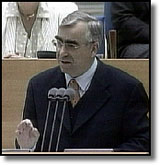
|
German Government Survives Euro Confidence VoteThe German government has defeated an opposition motion to sack Finance Minister Theo Waigel, under fire for his tactics to meet the economic criteria for the launch of the single European currency.Mr Waigel announced an effective freeze on government spending on Wednesday after being forced to compromise on his plan to revalue gold reserves as a way of reducing the budget deficit. Chancellor Helmut Kohl defended Mr Waigel in a four-hour parliamentary debate. He said there was no question of him stepping down, he had "marked German budgetary policy in a decisive phase for Europe". The Chancellor said he was convinced Germany would fully meet the strict criteria for European monetary union (EMU) on time. The Finance Minister mounted a strong defence of his policy. He announced he had now agreed with Bundesbank President Hans Tietmeyer that part of Germany's reserves held by the Central Bank would be revalued this year but with payments to the public purse being made only next year.
Mr Waigel said he would rein in spending by making the implementation of government projects costing more than a million marks (£350,000) subject to his personal approval. The opposition Social Democrats said all that was holding the government of Chancellor Helmut Kohl together was the hope of surviving until the scheduled election date of September 1998. They said Mr Waigel had misled parliament and the people with his budget plans and become a liability for Germany's international credibility over his attitude towards the Bundesbank, with which the government had entered into grave conflict. But they lost the vote by 328 votes to 311. Nearly three out of four Germans believe the government of Chancellor Helmut Kohl is no longer capable of dealing with its financial problems, according to an opinion poll published in the German weekly, Die Woche, on Wednesday. Fifty-two per cent wanted Mr Waigel to resign. |
Diana, Princess of Wales, 1961-1997
Conference 97
Devolution
The Archive
News |
Issues |
Background |
Parties |
Analysis |
TV/Radio/Web
Interactive |
Forum |
Live |
About This Site
News |
Issues |
Background |
Parties |
Analysis |
TV/Radio/Web
Interactive |
Forum |
Live |
About This Site
© BBC 1997 |
politics97@bbc.co.uk |

